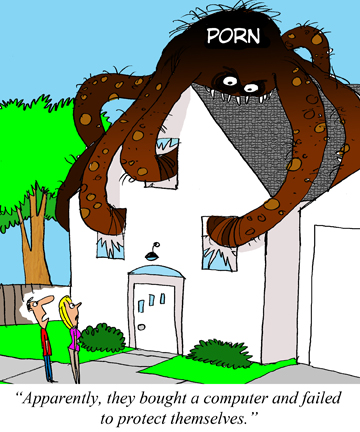By Diane Bowen

Cartoon by Jerry King
The room is dark. The green monster covered in scales draws closer. He silently slides out from under the bed and slowly rises to meet eyes with your child, who sits paralyzed on the bed. The room is deathly quiet. Your child tries to cry out, but only a whisper comes from his lips. Reluctantly and with great fear, he reaches for the bedside lamp. Click! The light is on and the monster has vanished.
Knowledge is power when it comes to dealing with monsters. Everyone knows monsters can’t live in the light.
10 Monsters in Our Home
Our children are older now, but we still have monsters in our house. Ten helpful yet dangerous monsters. They assist with shopping, schoolwork, send letters, and entertain us. I was surprised when I counted them—10 Internet accessible devices.
My children have a natural understanding of digital devices. By the age of 12 our son knew more about computer troubleshooting and repair than my husband, Rick. This was quite a feat, since Rick is an electronics guru who cut his teeth on MS DOS.
On the other hand, I kept my head in the sand regarding technology. I didn’t want to converse about it. I didn’t want to know what was possible to see online. I didn’t want to know anything more than how to search for a recipe and check my e-mail. Because I wanted my children to have plenty of time for play, I limited their time in front of the computer. The single computer we owned was in a central location. I only allowed my children to go online with one of us in the room. If we were not in the room, they had to sit together.
One day my oldest son said to me “Mom, we need an Internet filter.” Although I was in the house, I had completely missed their unintentional introduction to porn. My children were 8 and 12 years old sitting together looking for Lego sets when a search on Google exposed them to a host of inappropriate images.
The Monster That Devours Our Children
Technology is changing our social processes. Our children live in a sexualized culture. Sensual images fill the mall, line the expressway, and are a constant feed online. Cartoon and anime porn are popular with both adults and children. Gone are the days when the corner store was the only place to find pornography. The person who has an Internet accessible device has a porn magazine at their fingertips.
Staying abreast of the latest technology is an important responsibility for parents who want to protect their children. Children exposed to porn are more likely to experience feelings such as depression, anxiety, helplessness and guilt. Since all Internet accessible devices come with the capacity for secret pornography and cyberbullying, how can parents effectively protect their children?
Protect from the Monster
Does your child have an Internet accessible device they use regularly? Find out if the device can be protected by accountability or filtering software. If no protection software is available for the device, see if the Internet browser can be disabled. If not, think twice about allowing your children to use it. A convenient listing of devices that can and cannot be protected by Internet accountability software is provided in this Buyers Guide for Internet Devices.
Turn on the Light and Make the Monster Disappear
Children may balk at the idea of filtering Internet access or an accountability report of their Internet activity. Teens assume they have a right to privacy regarding their time online. “When Internet accountability is what everyone in the home does, teens are less likely to feel like they are being singled out,” says Luke Gilkerson, who discusses five effective things you can do if accountability causes disagreement in your household.
The single most important step for all parents is to model transparency in their online interactions. As a parent, you must set the example and hold yourself accountable for online activity, too. If you choose to protect your family with accountability or filtering software, discuss the idea of integrity, responsibility, and model accountability.
When our oldest son went to college, Rick and I suggested that he become our accountability partner. He receives our reports on a regular basis, just as we receive his. As I look back, we should have added him as our partner much earlier. Utilize the accountability reports and send your online activity to your teenagers. Allow them to hold you accountable for your online activity as you are holding them accountable.
Don’t be a Monster while Fighting the Monsters—Don’t Spy
Some parents of teenagers wish to avoid conflict regarding Internet use, but still want to know what their teens are doing online. Parents can spy on their children in two ways:
- Inform their children they are installing software on everyone’s Internet accessible devices and will be monitoring online use, yet not engage in meaningful conversations about Internet integrity. “It is essential that a parent’s leadership in this is genuine: don’t use personal accountability merely as a pretense to spy on your kids. Teens are too smart to fall for that,” Gilkerson says.
- Instead of an open and honest conversation about Internet integrity, parents secretly install software on their teen’s computer to monitor online activity. Patrick Smith discusses this practice in an article called “Spying vs Accountability: What’s the difference?” While a parent should have access to their teen’s Internet activity, spying on them is not acceptable. Spying destroys trust between a child and parent.
Transparency, discussion, and mutual accountability are key to avoiding the spying trap. “Both parties enter into accountability relationships intent on openness and honesty. Because of this foundation, accountability builds trust over time,” Smith says.
Open conversations initiated by a loving parent about proper behavior on the web and the dangers of inappropriate material should become as natural between parents and children as conversations about fitness, strangers, and home emergency drills.
No More Monsters Under the Bed
You are the catalyst to help your children live with integrity in an impure world. To be effective, parents must sacrifice time, energy, and resources. Accountability is important in all our interactions, not just those online. Children must realize that responsibility and integrity is a part of life.
Although protecting your children isn’t only about accountability and filtering software, that’s a great place to start and will begin the conversation. Turn the light on your family Internet activity and make those hidden monsters vanish.
Pure Minds Online | Issue 32 | More in this issue: When Porn is on the Report | 4 Ways Porn Kills Great Sex In Marriage | A Clear Life







